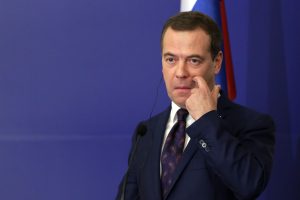With tension already high due to the Russian invasion of Ukraine, a social media post from Russia’s former president’s profile sent shockwaves through Central Asia, as its contents questioned the sovereignty of Kazakhstan, calling it an “artificial state.”
Dmitry Medvedev, who served as Russia’s president in 2008-2012 and was prime minister in the following eight years, wrote a long Vkontakte post at 4 a.m. on August 2. The post was later deleted and hackers were accused of having infiltrated his account.
According to the post, it was the Russians who “established the first settlements on the wild lands of northern Kazakhstan” at the beginning of the 17th century. These “wild lands” were colonized by Russia “for three centuries” and “before the collapse of the Soviet Union, 62.5 percent of the population of northern Kazakhstan were Slavs.”
After writing that “Kazakhstan is an artificial state,” the Medvedev account added that Guryev (now Atyrau), Semipalatinsk (now Semey), and Verny (now Almaty) were “former Russian territories.”
“In this century Kazakhstani authorities implemented resettlement policies of various ethnic groups inside the republic, which can be qualified as the genocide of Russians. And we do not intend to turn a blind eye to this. There will be no order until the Russians get there.”
The post, which included a similar section on Georgia, was full of colonial undertones that harkened back to the Tsarist expansion into the Caucasus and Central Asia of centuries ago.
The use of “russkiye” (ethnic Russians, as opposed to the more neutral “rossiyskiye,” or Russian passport holders) and of “Alma-Ata” instead of the current official name “Almaty” clearly underscored a supercilious attitude toward Kazakhstan. The message was a show of superiority, on both ethnic and political grounds.
Despite being deleted soon afterwards, the post was seen by thousands in its original version and by hundreds of thousands via screenshots circulated via Telegram. Just on the widely read channel of Ksenia Sobchak, a former journalist and political activist, it was read over 500,000 times.
Kazakhstani residents took the post as a direct threat and an insult.
Political analyst Dosym Satpayev said in an interview with Bild that Medvedev can only be considered as part of the Russian propaganda machine.
“Many consider Medvedev as an active supporter of Russia’s aggressive foreign policy. Since the beginning of the war in February, Medvedev has not behaved much differently than such Russian propagandists as Simonyan, Keosayan, Solovyov, and so on,” Satpayev said.
The political analyst referenced a wide range of veiled and open threats to Kazakhstan sovereignty voiced by media personalities and political figures in Russia in the past six months.
In a Facebook post, journalist Lukpan Akhmedyarov called Medvedev’s post a collection of “all the main tenets of Russian imperialist chauvinism.”
Quoted in an article at The Guardian, Ekaterina Schulmann, an academic focusing on Russian politics, dismissed Medvedev’s political relevance, saying that “he’s trying to save himself from political oblivion.”
Still, the words of an ex-president carry a significant weight south of the 4,750-mile border that separates Russia and Kazakhstan.
In August 2014, during a state visit, Russia’s President Vladimir Putin complimented Kazakhstan’s then-President Nursultan Nazarbayev with a controversial statement: “He created a state in a territory that had never had a state before. The Kazakhs never had any statehood. He created it.”
By saying that Kazakhstan was never independent before 1991, Putin essentially implied that the existence of Kazakhstan was a gift from Moscow, perhaps an early inspiration for Medvedev’s post.
In response, Nazarbayev set up celebrations for 2015 as the country’s 550th anniversary of the Kazakh Khanate, a symbol of the country’s pre-modern statehood.
And the skirmishes haven’t just concerned political declarations in the media. For months, the Caspian Pipeline Consortium, an oil link between Kazakhstan’s western fields and the Russian port city of Novorossiysk, has experienced hiccups in its operations, which continue even after the lifting of an earlier ban.
In the meantime, Kazakhstan’s official response to Russia’s war has been in line with the predicaments of international law. At a public appearance in St. Petersburg in June, President Kassym-Jomart Tokayev said that the recognition of independence for the territories of Luhansk and Donetsk is out of the question.
Tokayev’s apparent “betrayal” of Russia’s military operation can be understood as part of the Kazakhstani leadership’s efforts to keep the country’s international status as a reliable partner.
Russia’s current and former top officials, instead, seem to want to exert continuous media pressure on neighbors and potential allies.
































